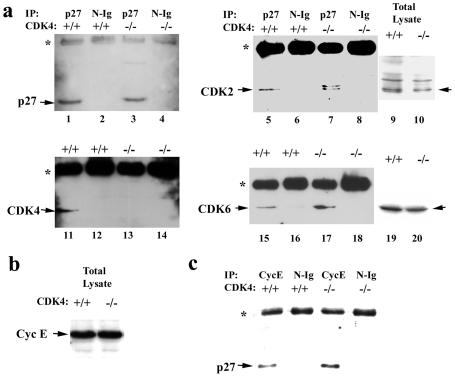FIG. 8.
Increased binding of p27Kip1 to cyclin E-CDK2 in serum-stimulated fibroblasts with targeted disruption of CDK4. (a) CDK proteins in complex with p27. Fibroblasts from CDK4−/− and CDK4+/+ mouse embryos were serum starved for 72 h (time zero) and then restimulated with 10% FBS serum for 18 h, as described in Materials and Methods and the legend to Fig. 7. Cell lysates were immunoprecipitated with affinity-purified anti-p27 polyclonal antibody or normal IgG (N-Ig) as a control. The immune complexes were then analyzed by immunoblotting by using anti-p27 (lanes 1 to 4), -CDK2 (lanes 5 to 8), -CDK4 (lanes 11 to 14), and -CDK6 (lanes 15 to 18) monoclonal antibodies. Total lysates without immunoprecipitation were also analyzed by immunoblotting with anti-CDK2 and -CDK6 antibodies (lanes 9, 10, 19, and 20). The asterisks indicate heavy-chain IgG cross-reactive with secondary antibody used for immunoblotting. (b) Expression of cyclin E in CDK4−/− and CDK4+/+ fibroblasts at 18 h after serum stimulation measured by immunoblotting. (c) p27 protein in complex with cyclin E in in CDK4−/− and CDK4+/+ fibroblasts at 18 h after serum stimulation. These data represent three separate experiments with different clones of embryonic fibroblasts.

